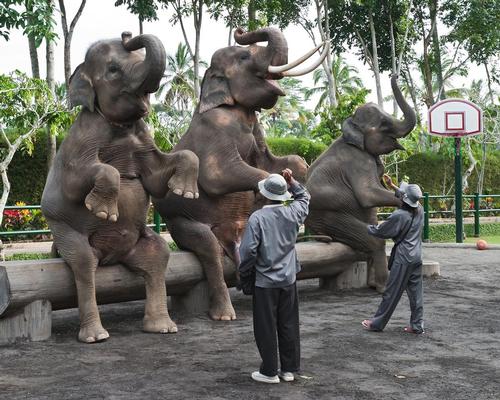22 Aug 2019
World Animal Protection report accuses accredited zoos of animal cruelty
BY Andy Knaggs

Zoos and aquariums associations have criticised a report by World Animal Protection (WAP) which claims to have identified numerous examples around the world of wild animals being used in cruel and demeaning ways in the name of visitor entertainment.
According to the report by WAP – an international nonprofit organisation that promotes welfare and humane treatment of animals – 75 per cent of the World Association of Zoos and Aquariums' (WAZA) members offer at least one animal-visitor interaction. The report cites 1,241 members, a figure which includes zoos or aquariums that belong to WAZA-member associations.
Among the report's findings were examples of big cats being forced to perform on stage to loud music, dolphins being forced to perform stunts and allow trainers to "surf" on them, elephants being forced to give rides to tourists and perform in shows, and primates being dressed in costumes and used as photo-props.
WAZA only claims 400 members worldwide, but according to the WAP report, many others can be linked to WAZA, via their membership of regional and national associations. For example, SeaWorld San Antonio in Texas was considered an indirect member of WAZA by WAP, through its membership of the US-based Association of Zoos and Aquariums (AZA), which is a member of WAZA.
Quoted in a report by National Geographic, WAP's global wildlife advisor Neil D'Cruze said such indirect members were included in the report because WAZA should, at a minimum, outline a code of ethics and animal welfare policy for those zoos and aquariums.
WAZA responded to the claims by refuting the accuracy of elements of the WAP report. In a statement, the body said that it agreed with WAP that "such practices have no place in a modern zoo or aquarium", but added: "Unfortunately, the report contains a number of inaccuracies, including naming institutions which are not WAZA members and thus which WAZA has limited jurisdiction over."
Of the 1,241 venues surveyed by WAP in total, 940 were classed as indirect members of WAZA. The report says that 43 per cent of facilities offered petting with wild animals, about a third offered walking or swimming through an enclosure, 30 per cent had performances involving wildlife, and 23 per cent had hand-feeding experiences.
"WAZA does not have accreditation standards, and is not an accrediting body," said an AZA statement. "It relies on associations, like AZA, the European Association of Zoos and Aquariums (EAZA) and the Zoological Association of Australia (ZAA) to provide accreditations.
"Accredited facilities, like SeaWorld San Antonio, hold themselves to high standards and are still only a fraction of facilities that hold and display animals.
"Professionally-designed and monitored animal ambassador and encounter programs, including “swim with” programs, have proven educational benefits and inspire guests to respect animals and support their conservation.
"Restricting these activities ultimately limits opportunity for an increasingly nature-disconnected public to experience animals, creating connections, and inspiring them to respect, value and work to conserve wild life and wild places."
Close Window